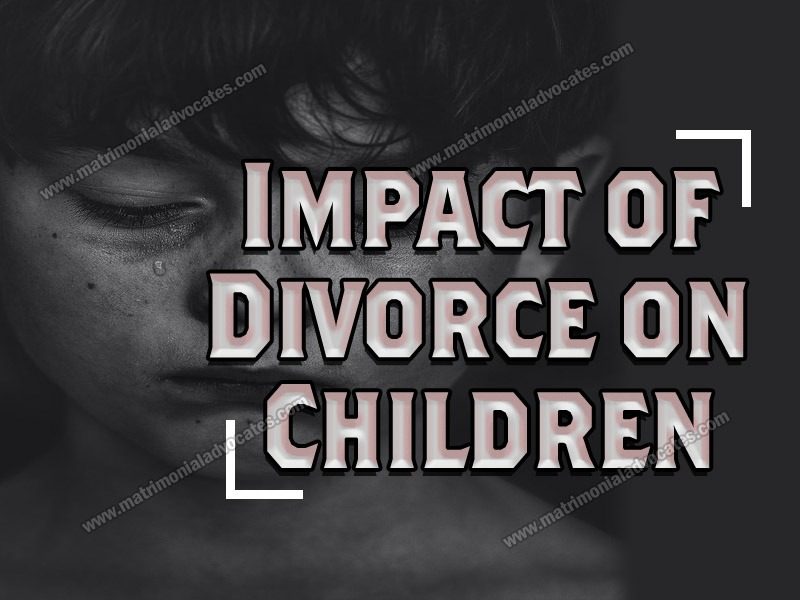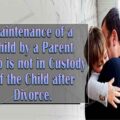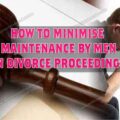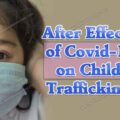
A divorce obtained through mutual consent of both spouses or through contesting in a court of law results in the termination of marriage between two persons and not only causes stress and trauma to both the estranged spouses but also to children born out of that marriage as it more often than not results in custody battles for the child and is bound to cast irreparable emotional, psychological scars upon the child.
It is noteworthy that in a recent judgment passed on 20/02/2020 the Hon’ble Supreme Court has held that in a custody battle the child is always the loser, no matter which parent wins.[1]
The effects and ramification of the divorce can impact the child in both positive and negative manner depending upon the emotional well being , level of maturity and psychological make up of the child or children.
Negative impact of divorce on children
- Anxiety
The aftermath of a divorce causes the child to become tense, nervous, and anxious. Young children are more prone to it than the older ones since they are heavily dependent on both the parents. An anxious child will find it difficult to concentrate on his studies and may lose interest in activities that he once found enticing.
2. Emotional Problems
Children who belong from broken homes often suffer from a multitude of emotional problems. Kids manifest their emotional distress by showing symptoms like bedwetting, excessive clinginess and irrational disobedience.
Kids who are constantly exposed to their parents fighting develop a deep rooted feeling of anxiety and insecurity. Sometimes children get recurring nightmares and bad dreams which reflect their inner sense of disquiet. Often children who come from broken homes show erratic behaviour patterns and ambivalent behaviour. Psychiatric counselling is often recommended to kids who have faced parental problems and have exhibited resultant emotional issues.
3. Withdrawal from Reality
Many children are extremely sensitive and may be unwilling to comprehend or accept the fact that their parents are separating. Children often resort to building a fantasy world in which their parents are still happily together and as a result experience withdrawal from reality.
It is also seen that children often harbour unrealistic expectations of their parents getting back together even when the divorce has been formalised and completely accepted by both parties. Such kids often cause problems in their parent’s personal lives as they still harbour the expectation that their parents will continue to coexist together as a perfect family.
4. Insecurity and Depression
Divorce or separation often brings with it a change in the residence, environment and life style of the kid. Such changes disturb children and make them fearful and insecure. Insecurity often stems from the fact that the utopian concept of the perfect home with two loving parents is shattered. Children often become confused about their future and this confusion leads to fear psychosis and depression.
Unfavorable social comparisons and taunts and jibes from friends further alienate children from broken home pushing them nearer to a depressed state. The first signs of insecurity in such children should be recognized and corrective measures of counselling should be taken.
5. Behavioural Issues
Often kids of divorced and separated parents are seen facing disciplinary problems in school. While some kids tend to withdraw into a shell and become unresponsive; still others become hyper active and unresponsive.
Disobedience and acts of rebellion against persons of authority are a side effect of pent up resentment and anger in the minds of kids who are facing problems at home. Sometimes kids who do not react at all at home in front of parents show their angst and distress via behavioural problems at school and with friends.
6. Sense of Divided Loyalty
Often kids who belong from homes with warring parents suffer from a sense of divided loyalty. Often parents make their kids a point of contention in their mutual differences and force them to take sides. Kids are asked to choose between their mother and father as each try to belittle the other spouse in front of their children.
Children who are forced to take sides often suffer from a guilty conscience and start blaming themselves for being forced to take sides. Many children turn against one of their parents and the relationship between the parent and child gets permanently damaged.
7. Prone to substance abuse
Drugs and alcohol become the avenues for adolescents to vent out their frustration and anxiety. Research has shown a higher incidence of substance abuse in teens whose parents are divorced Of course, there are other factors like the care provided by the single parent, which determine the adolescent’s tendency to have drugs. However, the probability of an adolescent succumbing to the temptation is considerably high. Long-term substance abuse has damaging effects on the well-being of the child.
8. Depression
The feeling of anguish and heartbreak caused by parents’ divorce can make a child slip into depression. Depression is a mental health problem, and children who witness divorce have a higher incidence of depression and social withdrawal. Researchers note that divorce can be a contributing factor in cases of bipolar disorder observed in children.
9. Poor education and socio-economic position
The adverse psychological effects of divorce diminish a child’s interest in education. Children who experience the divorce of their parents show a drastic drop in their school grades It can significantly impede a child’s ability to learn at school and college. A stunted progress in education hampers career prospects of the child as an adult, which make it difficult to have a decent socio-economic status.
Positive impact of divorce on children
1. Happy parents denote a happy child
The child no longer has to experience a tense atmosphere at home as they are no longer greeted by arguments, they return home from school or college with a positive mindset. It also ensures that the child does not wander away with a bad company to avoid squabbling parents at home.
2. The child could be less prone to addiction
The separated parents can now focus on the children as the task of getting divorced is completed. The kid does not have to rely on pseudo-comforters like drugs and alcohol.
3. The child spends quality time with parents
If the child is free to shuttle between the houses of his both parents, then he may spend fruitful time. His interactions are no longer interpreted by an argument, and he can pour his heart out freely. It also gives each parent an opportunity to divide the responsibility equally.
4 . Better grades
Research has shown that divorce can help a child study better and improve his grades since he no longer has the baggage of quarreling parents back home Also, each parent dedicates their time for the child’s homework and studies.
5. Children may not repeat their parents’ mistakes
Children who witness the split of their parents can show maturity and patience while managing conflicts in their relationships.
They communicate better and always strive to be good by not repeating the mistakes of their parents. This could be a positive way of looking at a divorce, if that is imminent. The child’s reaction to their parents’ decision depends on various factors such as the age of the child and gender.
Conclusion
The
effects of divorce on a family can not be easily brushed aside and for the
normalcy to prevail again would take a considerable deal of mental strength and
external support to a child. There are multiple
negative effects of divorce and separation on kids. With proper counselling and
guidance from seniors parents should try to save their marriage for the sake of
children so that most of the unpleasant effects of divorce and separation on
kids can be averted.
[1] Judgment passed by the Hon’ble Apex Court of India through a bench comprising of HMJ AM Khanwilkar and HMJ Ajay Rastogi.





